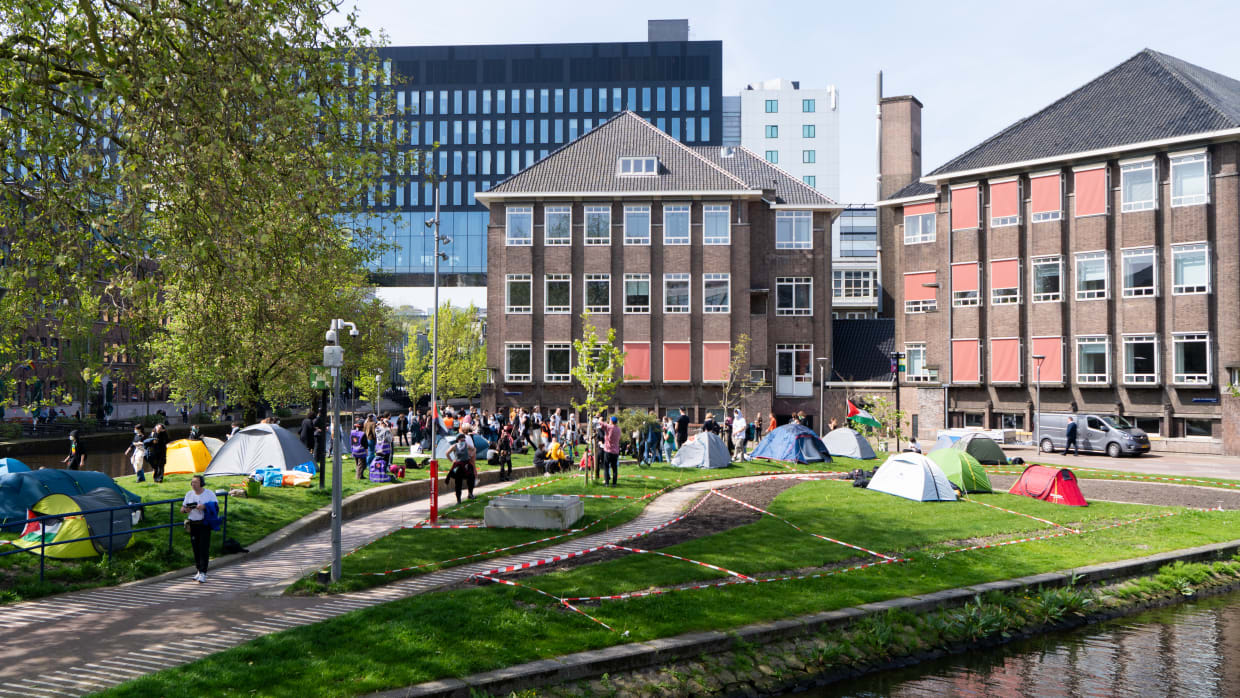
Third academic year into a genocide – where was the UvA?
Since January 2024, the International Court of Justice has been talking about a “plausible risk” of genocide in Gaza. Meanwhile, the UvA is anxiously debating protest slogans and political posters, instead of evaluating its own role with regard to war crimes, says associate professor Candida Leone.
After the atrocities of 7 October 2023, students were quick to identify that the reprisal taking place in the Gaza strip had nothing to do with the hostages and everything to do with the Israeli government’s hardly concealed refusal to regard Palestinians – inside the Gaza strip, but outside of it just as well – as properly human. Unlike many of our leaders, they saw what Palestinians in vain tried to make the world see and Masha Gessen diagnosed on 9 December 2023 (“The ghetto is being liquidated”). In January 2024, the ICJ warned that there was a plausible risk of genocide and this triggered obligations for Israel but also for other States, including (public bodies in) the Netherlands – to prevent this genocide from occurring.
Meanwhile, our university was anxiously discussing the slogans used by (so far, entirely peaceful) protesters and our Board was explaining that “political” demonstrations such as those calling attention for an unfolding genocide were not allowed on campus. The revision of these undemocratic house rules – which entailed (and still entail) fastidious policing of employee’s doors and pantries in the hunt for “political” posters – is to date, still not finalised.
Clumsy
In response to the ban on “political” protests, the students shifted their focus from the broad political issue to the university and what it could do: namely, issue a statement of condemnation similar to the ones issued against Russia shortly before, and – again as done with Russia – suspend or cancel institutional cooperations. The Board first seemed, if clumsily, open – many of us got an awkward email seemingly asking to detail individual cooperations with Israeli colleagues, which was never the focus of the students’ demands. Then securitization came. Escalations spiraled after the hasty (and dubiously legal) choice to prompt evacuation of the first REC encampment, in a process which according to an external inquiry has seen the Board miss many opportunities for de-escalation. For almost two years now we have been stuck in a loop, with multiple non-discussions on the modes of the protests, while most learning on the substance – whether on Palestina, university ethics, international humanitarian law, colonial histories or human rights conditionality in EU trade policy - has been self-organized in a context of institutional suspicion.
Last Monday saw form once more triumph over substance. While the short speech by the student protesters was met positively by a large part of the audience, the rector could not allow the choreography of the inauguration to be disrupted or slowed down. He “was forced” to shut down the event to then claim onmacht (why would one complain he doesn’t have police powers if he would not want to have them?) in the news. Meanwhile, staff and students wearing keffiyehs were excluded from the (not cancelled) reception, irrespective of whether they took part or even showed solidarity with the protests.
The rector, again, wants to have conversations with protesters about the form of the protests instead of discussing with the UvA community how we can do all we can to end complicity, pressure the Dutch government to uphold international law (including by prosecuting war criminals when they set foot on Dutch soil), and support Palestinians enduring a genocide enabled by technology and expertise that we have significantly contributed to through Dutch investments and European funds. Meanwhile, to my knowledge, nobody has sought contact on these issues with the many students and employees who, on the same day, joined the “non-disruptive” (aka respectable) walk out of 12 pm.There are many things that our university, and other universities, can do.
Callous insistence
First, condemn the Government’s refusal to take on young patients in need of specialized care; support the International Criminal Court and do what is necessary to put Dutch jurisdiction for war crimes and crimes against humanity into action; stop all exports of military and policing tools; make sure that “Scholars at risk” initiatives prioritise existential risk (in Gaza and elsewhere) over “top talent” scouting. Follow Maastricht University’s example and set up scholarships for students from Gaza, where no universities are left standing. Call out the government’s callous insistence on humanitarian aid and instead voice the need for an immediate, unilateral end to the hostilities and sweeping, broadly constructed sanctions. Whereas it’s highly questionable that Israel could claim a right to self-defense in 2023 to start with, it is clear that this is not the aim of the ongoing devastation.
Second, on the example recently set by Utrecht University, publicly and unequivocally confirm that no new institutional cooperation will be initiated with institutions from a state currently engaged in genocide and violent territorial expansion and repeated aggression in its surrounding region. This is all the more urgent since at present a suspension of Israeli institutions from access to the Horizon scheme (as proposed by Commissioner Kallas after review) is only not taking place because of reckless vetoes by some Member States. Such a statement would also mean finally achieving clarity on the cooperation protocol with Tel Aviv University, which is for months now poised for review with no transparency on the state of the process. It would hardly explain, however, how the number of Horizon cooperations with Israeli institutions and companies has grown since April 2024.
Windows
Third, publicly and seriously reconsider our reliance on Windows infrastructure – the same infrastructure that has benefitted from the total surveillance imposed on Palestinian communications, while data storage for these “projects” is allegedly provided by servers in the Netherlands. This will be easier if universities join forces to create alternative infrastructures, as suggested by colleagues for so many valid reasons.
Fourth, the UvA can stop feeding polarization by setting out “Jewish” students and staff against “protesters”, all the while flattening the many diverse constituencies, and sources of knowledge, that our institution brings together; the rector, in particular, could wisely give up his apparent prerogative to decide for whom the university does and does not need to be a safe space. Instead, going ahead, rector and Board can choose to undertake concrete actions to make everyone safe by fostering solidarity and tolerance rather than further igniting the fears stoked by pundits and politicians with no interest in healthy academic communities.
That would combine good leadership within the institution and proper exercise of the responsibility that we collectively carry “towards science and society”.
Otherwise, of course, the university leadership can keep crying foul in the press, muddling through until the next advice or court judgment, and hope that respectability politics will impress the next incompetent minister or stave off the next populist attack. We have seen this script before. Will we be surprised?
Candida Leone is associate professor at the Amsterdam Centre for Transformative Private Law of the UvA.

